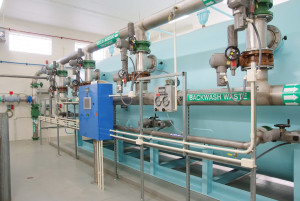Engineers Keep Drinking Water Safe
 The concept of taking preventive measures to protect ourselves or our surroundings from catastrophes isn’t new – after all, Benjamin Franklin said “an ounce of prevention is worth a pound of cure” back in the 1700s. It is unfortunate that it often takes a catastrophe to demonstrate the need for prevention.
The concept of taking preventive measures to protect ourselves or our surroundings from catastrophes isn’t new – after all, Benjamin Franklin said “an ounce of prevention is worth a pound of cure” back in the 1700s. It is unfortunate that it often takes a catastrophe to demonstrate the need for prevention.
Franklin’s adage is registering with many people as reports of drinking water problems have surfaced frequently in the media in the past few months, with news out of Flint leading the way. The eastern Michigan city with a population of about 100,000 has received international attention for its lead crisis. Do a Google search for “Flint, Michigan” and almost every hit pertains to the city’s water problems. The crisis even has its own Wikipedia page – not the sort of attention any city wants or that Flint will be able to shake for a long time.
Flint isn’t the only community whose residents are worried about lead in drinking water. Concerns have been raised in Chicago, Milwaukee, some Ohio communities, and elsewhere. The effects of exposure to lead are especially devastating in children younger than age 6; lead can harm organs, slow development, cause behavioral and learning problems, and more. Damage can be severe and permanent. But lead isn’t the only problem when it comes to the nation’s drinking water supply and contaminants. Communities and private well owners have to be on the lookout for all kinds of dire-sounding contaminants, such as nitrates, atrazine, arsenic, radium, and tetrachloroethylene. These types of contamination can come from sources such as agricultural runoff, industrial emissions, or naturally occurring deposits in aquifers.
 We have helped many communities get a handle on their water contamination problems, working with them to reduce or remove such contaminants as radium, arsenic, nitrates, and iron. A series of projects in Clintonville helped that Wisconsin city remove naturally occurring arsenic from its water supply; the community’s arsenic removal system is shown at right. We also obtained funding for and helped the Village of Lena, Wisconsin, treat its water after high levels of radium were detected. In Reedsville, Wisconsin, Ayres designed well upgrades to remove nitrates from the water system.
We have helped many communities get a handle on their water contamination problems, working with them to reduce or remove such contaminants as radium, arsenic, nitrates, and iron. A series of projects in Clintonville helped that Wisconsin city remove naturally occurring arsenic from its water supply; the community’s arsenic removal system is shown at right. We also obtained funding for and helped the Village of Lena, Wisconsin, treat its water after high levels of radium were detected. In Reedsville, Wisconsin, Ayres designed well upgrades to remove nitrates from the water system.
Water systems can also experience other issues beyond quality, such as the need to meet high levels of demand and pressure levels. Ayres Associates has experience with water system issues related to the delivery of water for needs as diverse as drinking and fighting fires.
If you have questions or concerns about the municipal system you operate – regarding water quality, storage or containment systems, pressure, capacity, or your piping – please contact our water professionals to discuss preventive or improvement measures for your municipality. Just click the “View Contacts” button on the general civil/municipal engineering page to find an expert near you.

Post a comment: